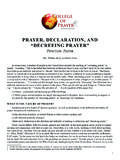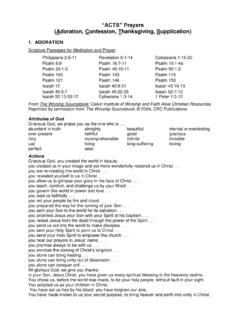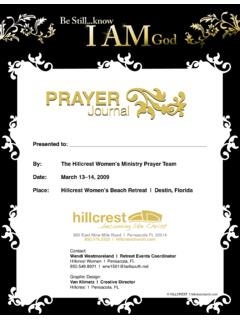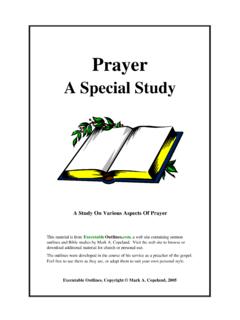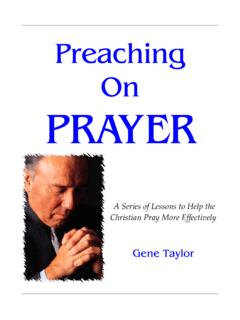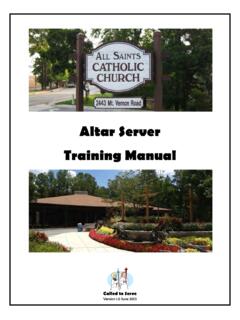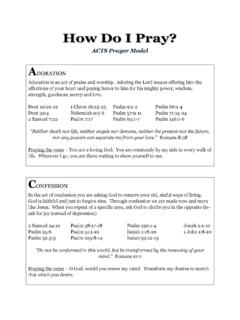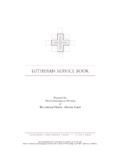Transcription of PRAYER, DECLARATION, AND “DECREEING PRAYER”
1 1 prayer , declaration , and decreeing prayer Position PaperRev. William Hyer, Academic DeanIn recent years, a number of people in the Church have adopted the teaching of decreeing prayer or simply decreeing . This is the belief that believers in the Lord Jesus Christ, and the Church by its very nature, have been given authority and power to decree, and that this can be done in the form of prayer . decreeing prayer is conceived of as an authoritative command or law issued by a believer to cause something to happen, most generally to bring what is in heaven into the earthly realm. Often decreeing prayer is spoken of and used in conjunction with a declaration . Because of this, it is the practice of some to begin or say in their prayer , I decree and It is believed that through these words, and specifically decreeing , that Christians have authority and power to cause what is spoken to take place.
2 Thus, people will say such things as, I decree heal-ing, I decree prosperity, I decree the salvation It is the position of this paper that:(1) Prayer1, declaration and decreeing are different things.(2) While prayer and declaration are taught and supported in Scripture, there is no teaching or support in Scripture for the practice of decreeing prayer or decreeing by IS THE NATURE OF prayer ?Fundamental to the matter of decreeing prayer , as well as declaration , is the definition and nature of prayer . Related to this definition is: (a) the direction of prayer , or toward Whom or what is prayer spoken, and (b) the inherent authority of are in distinction to the direction and authority of making a declaration and decreeing prayer . prayer can be defined with two senses: general and restricted. In the most general sense, prayer is commu-nicating and communing with God in some way.
3 Most often, it is with words, speaking to God about anything one wants to say. Anybody who can speak can pray and talk to God, whether it is an infant who cries, Daddy or Abba, Father (Romans 8:15) or an adult. However, sometimes known words are not possible, as Romans 8:262 states, In the same way the Spirit also helps our weakness; for we do not know how to pray as we should, but the Spirit Himself intercedes for us with groanings too deep for words. Overall, prayer is an act of worship that includes praise and adoration for Who God is and thanksgiving for what He has done. However, in the more 1 As the next section on the nature of prayer states, it is prayer in the restricted sense that is different from Unless otherwise noted, all quotations of Scripture are from NASB Updated (NASB95).2restrictive sense, prayer is a request, a petition, an asking God for something one English word pray, as well as prayer , comes from the Latin precare, which means to ask earnest-ly, beg, entreat.
4 There are a number of Hebrew words translated pray and these include: (a) palal which means to intervene, intercede. The root idea is fall and means to fall down to the ground in the presence of one in authority pleading a cause. 4 (Genesis 20:7; Numbers 11:3; Deuteronomy 9:20, 26; 1 Samuel 1:10, 27; 2:1; 7:5; 2 Chronicles 7:14)(b) atar which is used as a submissive modest request5 and is related to the word sacrifice. 6 (Genesis 25:21)(c) na which means please. (Genesis 32:11; Numbers 14:17, 19; Deuteronomy 3:25; 2 Samuel 15:31)(d) athar which means plead, supplicate, entreat. (Exodus 8:9)(e) tefilah which means beg, beseech, implore. (Psalm 69:14)Also, a common metaphor for prayer is to cry out. (Numbers 12:13; Judges 3:9)The Greek word translated pray is proseuchomai which occurs 90 time in the New Testament. It literally means to want, desire, or wish toward.
5 This is why the classic definition of prayer given in answer to ques-tion 90 of the Westminster Shorter Catechism, What is prayer ? , is prayer is an offering up of our desires to God. 7 There are numerous synonyms for prayer in the English translations of New Testament:(a) Ask - aiteo (Matthew 6:8; 7:7-11; 18:19; 21:22; John 14:13-14; 15:7, Colossians 1:9; James 1:5 6; 1 John 5:15). This was a primary word Jesus used for prayer (John 14:16; 17:9, 15, 20).(b) Petition - deesis (Luke 1:13; Ephesians 6:18; 1 Timothy 2:1)(c) Supplication - deesis (Philippians 4:6; Hebrew 5:7)(d) Entreat - deesis (1 Timothy 2:1; 5:5)(e) Request - erotao (John 16:26; Romans 1:10; Philippians 4:6; 1 John 5:15)(f) Beseech - deomai (Matthew 9:38; Luke 10:20)(g) Appeal - parakaleo (Matthew 26:53)(h) Implore - parakaleo (2 Corinthians 12:8)(i) Intercede - huperentugchano (Romans 8:26)(j) Intercede/Intercession - entugchano (Romans 8:27, 34; Hebrews 7:25)As is evident from these words, a prayer , in the restrictive sense, is a plea, petition, and request of asking the sovereign God for what one needs, wants or desires.
6 All the parables of Jesus concerning prayer are about requesting and petitioning, not declaring, let alone decreeing : the son asking his father for bread, the friend at midnight imploring his neighbor for food, the widow petitioning the judge for justice, the tax collector pleading for mercy. This is the nature of a prayer - to ask, plead, direction of prayer is toward Thus, for example, the Lord s prayer begins, Father (Matthew 6:9; Luke 11:2). This is expressed in the primary physical act and metaphor for prayer in Scripture of offer-ing incense that ascends up to God (Exodus 30:8; Psalm 141:2; Luke 1:10; Acts 10:4; Revelation 5:8). While 3 Notice the distinction in Philippians 4:6, Be anxious for nothing, but in everything by prayer and supplication with thanksgiving , let your requests be made known to God. prayer is supplication and request and it is made with thanksgiving .
7 4 Jeff A. Benner, Ancient Hebrew Research Center5 Gesenius Hebrew-Chaldee Lexicon6 Harris, Archer, Waltke, Theological Wordbook of the Old Testament, , page 7087 The answer goes on to say, for things agreeable to his will, in the name of Christ, with confession of our sins, and thankful acknowledgment of his mercies. 8 Pray in the most inclusive use of the word can also be a request or petition to someone or something believed to have ability and power to answer the request. Thus, it can be the humble request to a person, especially one in authority, or an idolatrous prayer made to other gods. However, it always a request that one be please to have authority to have access to God through the Lord Jesus Christ in the Holy Spirit (John 14:6; Ephesians 2:18: Hebrew 10:19-22), we have no authority or power to cause a prayer to be answered.
8 This is demonstrated in the Biblical language of God hearing or not hearing our prayer , and even hiding His face from us because of our sin. The LORD states this in Isaiah 1:15, So when you spread out your hands in prayer , I will hide My eyes from you; yes, even though you multiply prayers, I will not listen. Your hands are covered with blood. And again in Isaiah 59:2, But your iniquities have made a separation between you and your God, and your sins have hidden His face from you so that He does not hear. prayer , in essence, is the humble expression of total dependence on God Who cannot be compelled or manipulated to answer prayer but grants answer to prayer as He is pleased according to His gracious will and holy purpose for His glory. While people speak of the power of prayer , prayer itself actually has no power. The power of prayer is God Who answers prayer .
9 This was taught by the Lord Jesus in one of the most im-portant principles on the power of prayer in Matthew 18:19: I say to you, that if two of you agree on earth about anything that they may ask, it shall be done for them by My Father who is in heaven. Jesus did not say, If two decree, but if two agree. They agree about what they may ask, which is prayer to the Father. This is because the power that causes the prayer to be answered and done for them is God, My Father who is in heaven. This is why Jesus spoke of faith as small as a grain of a mustard seed. It is not how big the seed is but how big God is, for He is the power Who hears and answers IS A declaration ? The English word declare comes from the Latin declarare, the root being clarus which means clear and de- meaning thoroughly. Thus to declare means to make thoroughly clear.
10 A declaration means to say something in an emphatic way, proclaim, tell, formally announce, state, assert, affirm something that is, make known, reveal. The primary Hebrew word translated declare is nagad (63 times in KJV). Also achvah is translated de-clare once in Job 13:17. There are a number of Greek words translated declare in the NASB:(1) apoangello - to announce (Luke 8:47; John 4:23; Acts 26:20; 1 Corinthians 14:25)(2) parangello - to order, command (Acts 17:30)(3) anaangello - to announce, report (Acts 20:27)(4) homologeo - literally to same word, to confess (Matthew 7:23)(5) apophthengomai - to speak out (Acts 2:14)(6) boao - to cry out (Acts 25:24)(7) horizo - to divide, separate, designate (Romans 1:4)The root of (1), (2) and (3) is angello, which means message, and is the root of the English word angel which literally means messenger.
